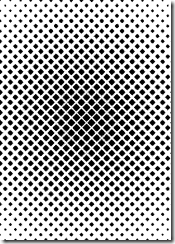One of my favorite toys at Techshop is the Epilog laser cutter. It can cut and etch at resolutions up to 1200dpi. It can cut through things like paper, cardboard, acrylic and thin wood as well as etching into those materials, metal and even food.
Lately I’ve been experimenting with creating pictures by cutting pieces out of colored card stock and stacking them up. The way to think about it is that each layer of paper gives you a single color – it’s like a 1-bit monochrome bitmap that’s either the color of the paper or transparent showing what’s behind it. Newspaper printers figured out ages ago how to deal with a similar set of constraints – a single ink color, but high resolution of ink placement – and approximate multiple shades of color using a technique called half-toning. Here’s how I adapted this technique for paper-cut images.
My first test was to see how I could approximate a gradient fill. I started by creating a jpeg image containing a simple black-to-white radial fill (left). Then in my paint program I converted the grayscale image to a monochrome black-and-white image. When you do this in CorelPaint it gives a variety of options on how to do the conversion. One of them is creating a half-tone image, which is what I used. I created a halftone using squares (dots are the ones you see in newspapers) at a 45 degree angle and a very low resolution of 7 lines per inch. The result is the picture on the right.
Now I needed to turn this image into vector outlines so the laser cutter can deal with it. I imported the bitmap into CorelDraw and used the bitmap tracing feature to trace it in line-art mode. Corel’s tracing is fairly flexible and can attempt to trace multi-colored images by creating vector shapes in different colors. Sometimes even if you feed it a simple picture, things like anti-aliasing artifacts can trick it into using a bunch of colors which I didn’t want. Using line art tracing settings gave me a shape containing about 1500 little vector polygons that approximated the half-tone bitmap. I gave the shape an empty fill and hairline outline which tells the laser cutter to perform a cut of the outline rather than a raster-scan etch. The result looks like the image below.
It turns out the hardest part of the project was getting time on the laser cutter. My schedule has been very busy and between travel and working evenings and weekends I’ve only had a few chances to get to Techshop recently. The two laser cutters are very popular so it was almost 2 weeks before I had a chance to try it out. I cut at 600dpi, 100% speed and medium-low power which gave good speed and minimal charring. They call it a cutter, but what it’s doing is burning the paper, so too high a power or too slow a speed will end up with visible burn marks on the paper. A fire in the machine is a possibility as well and before they let you use the cutter you have to take a safety class where they force you to deal with a fire, which is not nearly as exciting as it sounds but still awesome.
I cut it out of dark brown card stock and then placed it on top of a background of red construction paper . The result is a radial ramp from red to brown that looks pretty good. I could have made the squares a lot smaller, but wanted them to be fairly big and obvious. Also, the file took 10 minutes to cut as it is. With a lot more polygons it would have increased the cutting time significantly.
You’ll notice that in the middle the halftone squares got so close they ended up touching and it cut the entire middle out. I didn’t worry about it because this was going to be the background for a picture and the middle would end up being covered. The full finished picture was a picture of a tea drink my daughter likes which you can see below. The additional layers are glued on top of plastic and acrylic spacers to give the whole image depth and the upper layers actually cast shadows on the lower ones.
Tags: art, laser cutter

Wow this looks awseome! you should add more pictures in this collection I think they are great!
thanks